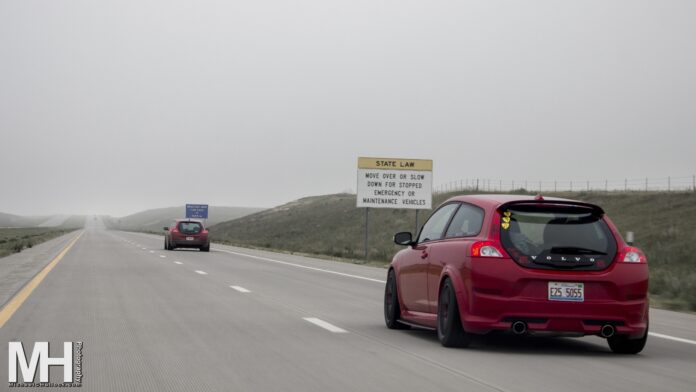Modifying cars is a hobby and lifestyle that provides owners with an opportunity to improve and personalize their vehicles. While modifications can be fun, there is no doubt that some mods can sacrifice a car’s reliability; a risk which many enthusiasts choose to accept.
Some are fortunate enough to have a designated daily driver, but many enthusiasts only have one vehicle and rely upon it for everything from commuting to track days to road trips to Grandma’s. Unless you truly lack faith in your car’s reliability, it is important to remember that extensive highway miles and long operating hours are generally less strenuous on an engine than short drives and hard launches. There is no reason why a modified car cannot be trusted on a long journey.
The following are my top ten suggestions for preparing a modified car for a road trip.
Avoid turning wrenches within one week of departure. A lot can go into preparing a modified car for a road trip. Perhaps you need to flash a more versatile tune, maybe it is time to rotate the tires, or maybe you simply procrastinated with installing those last few parts. Do not make your road trip the maiden voyage on an untested vehicle. Budget your time to complete your car to-do list at least one week prior to departure, providing sufficient time to break in new parts and ensure there are no problems.

Drive before you leave. Have you ever wondered why a daily driven car so often proves to be more reliable than a similar car that is reserved for the weekends? No, I am not comparing a Honda Accord daily to a once-a-month driven Porsche 911. I am comparing a tuner Miata daily versus a tuner Miata weekend toy.
Vehicles that are used frequently have fluids flowing, bearings turning, and suspensions compressing. They are not sitting, rotting, and seizing up. Therefore, you should drive your car in the days leading up to departure to ready it for the road and test for potential problems.
Chuck your lug nuts/bolts torque. It should not matter if you just came from a trusted tire shop or you personally rotated your tires last week, always check your lug torque before you depart on a road trip.
Checking wheel lugs should be a routine habit in daily life. I would strongly encourage bringing a torque wrench with you to not only check your lugs at rest stops, but also be prepared for an emergency wheel change.
Inspect tire tread, condition, and air pressure. Similar to lug nuts, checking your tires’ air pressure and wear should be a routine habit. Make sure your tires are properly inflated, especially before adding an extensive number of miles. Check that there are no punctures, dry rot, or damage to the tires that may become problematic on the highway. Lastly, measure the remaining tread life of your tires and consider how many more miles they are about to endure. Will you be driving through rain or snow? Are your tires equipped for those conditions?
Do not forget about the spare! If you have the resources and cargo space, bringing a full size wheel in lieu of the factory donut may be a better option.

Pack tools, parts, and an OBDII scanner. You pack snacks and clothes for yourself. Why not do the same for your car?
It is always advisable to travel with a few tools. You will not need your entire tool arsenal, just the basics should suffice in an emergency breakdown situation. I like to pack a small ratchet set, a few adjustable wrenches, a rubber mallet, a torque wrench, a jack, and an adjustable screwdriver with varying bits.
I also suggest packing some miscellaneous parts: Zip ties, duct tape, some spare hoses, hose clamps, electrical wire, light bulbs, fuses, and string. Even if your car is perfect and has never required an emergency fix, rough roads, varying weather and climate conditions, and changes in elevation can stress your car in new ways. Carrying a few resources could help you Mcguyver your way out of trouble.
Lastly, pack a portable OBDII scan tool. You can find a dongle to pair with a phone app for as cheap as $10. While this might not give you detailed code readings, it can at least help you decipher the difference between an inconvenient engine light or a serious problem.

Top off fluids. A week before your trip, top off all of your vehicle’s fluids: oil, coolant, brake fluid, power steering fluid, washer fluid, etc. Check the level of these fluids the day before departure and top off any if necessary.
Pack any additional fluids that you know your car might need. Does it burn oil? Bring more. Are you traveling to a performance driving event? Bring some brake fluid and coolant. Also consider packing some distilled water for your trip. Not only can this be an emergency supply of drinking water, but it can also be used as coolant without risking mineral buildup in your engine.
Check and test your wipers. Depending on where you are traveling, you may need to be prepared for extensive rain and snow. Make sure your front and rear wipers are ready for use.
Wash your car. You read that right, wash your car BEFORE you leave.
When you are about to travel hundreds or thousands of miles, things are going to get dirty. Washing your car before you leave, and possibly applying some polish or wax, will help protect the paint from this inevitable dirt and make it easier to hose off once you return home.

Familiarize yourself with local laws. When traveling across country or state boards, be certain to familiarize yourself with local laws.
Virginia does not allow radar detectors; a costly ticket that I paid for within one mile of entering the state. Oregon and New Jersey do not allow you to pump your own fuel. Georgia is a hands free state; you can even be fined if a mobile device is sitting loose on a passenger seat or cupholder.
Maryland is especially strict on camber and ride height laws. Are you traveling with a firearm? Some states require weapons to be unloaded and/or out of reach from the driver’s seat.
Be prepared that state troopers may pull you over for local violations of tint, exhaust decibels, or lacking a front license plate, regardless of your home-state laws. You cannot be ticketed for something that is actually legal where your car is registered, but do not give law enforcement another reason to write you up. Know the laws for where you are traveling and always be respectful in the event that you are pulled over.
Consider a rental car. As devastating as not driving your personal car may be, consider when a rental car might be the wiser decision. You know your car and its limitations, do not take risks.

Does your vehicle require premium fuel or E85? Availability at your destination could be scarce.
Are you running R compound tires? Is your engine a gas guzzler? Does your transmission gear ratio cruise at high RPMs? Compute the per-mile operating cost of your personal car. You may discover that renting a car could be the cheaper method of travel.
Of course, even rental cars should be run through a checklist prior to departure. Complete a full walkaround with the rental car personnel before leaving and be certain to check for loose body panels or low fluids that may cause problems.
Road trip issues can often be unavoidable, but taking a few simple precautions will make you better prepared. Stay safe, drive alert, and enjoy the journey on the open road.








